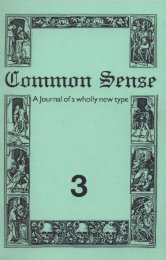i on thomas paine reviews: origins of crisis in ussr - Common Sense
i on thomas paine reviews: origins of crisis in ussr - Common Sense
i on thomas paine reviews: origins of crisis in ussr - Common Sense
Create successful ePaper yourself
Turn your PDF publications into a flip-book with our unique Google optimized e-Paper software.
Trial by Space: Reflecti<strong>on</strong>s <strong>on</strong> Lefebvre Puge 33<br />
c<strong>on</strong>tradicti<strong>on</strong>s. These are c<strong>on</strong>tradicti<strong>on</strong>s <strong>of</strong>. society - c<strong>on</strong>tradicti<strong>on</strong>s between <strong>on</strong>e th<strong>in</strong>g and<br />
another with<strong>in</strong> socie ty... - that simply emerge <strong>in</strong> space, at the level <strong>of</strong> space, and so<br />
engender the c<strong>on</strong>tradicti<strong>on</strong>s <strong>of</strong> space." (1991 p358) If the social is <strong>in</strong>herently spatial and<br />
can <strong>on</strong>ly exists as such, then the former cannot be juxtaposed to the latter; social<br />
c<strong>on</strong>tradicti<strong>on</strong>s do not exist <strong>in</strong> space but express themselves spatially.<br />
Hav<strong>in</strong>g moved from the c<strong>on</strong>tradictory nature <strong>of</strong> abstract space to c<strong>on</strong>tradicti<strong>on</strong>s <strong>of</strong> space,<br />
Lefebvre suggests that the latter c<strong>on</strong>ta<strong>in</strong>s the potential space for the emergence <strong>of</strong> a new<br />
order, that <strong>of</strong> djfserentiul space. "The 'right to difference' is a formal designati<strong>on</strong> for<br />
someth<strong>in</strong>g that may be achieved through practical acti<strong>on</strong>, through effective struggle -<br />
namely c<strong>on</strong>crete differences ....This is a 'right' whose <strong>on</strong>ly justificati<strong>on</strong> lies <strong>in</strong> its c<strong>on</strong>tent;<br />
it is thus diametrically opposed to the right <strong>of</strong> property, which is given validity by its<br />
logical and legal form as the basic code <strong>of</strong> relati<strong>on</strong>ships under the capitalist mode <strong>of</strong><br />
producti<strong>on</strong>." (Lefebvre 1991 p396-7) But given the emphasis placed <strong>on</strong> spatiality by<br />
Lefebvre, space "itself" appears to become the <strong>in</strong>strument <strong>in</strong> mov<strong>in</strong>g towards, as well as<br />
the goal <strong>of</strong>, this new order: "space is becom<strong>in</strong>g the pr<strong>in</strong>cipal stake <strong>of</strong> goal-directed acti<strong>on</strong>s<br />
and struggles" and as such marks "a transiti<strong>on</strong>al period between the mode <strong>of</strong> producti<strong>on</strong> <strong>of</strong><br />
th<strong>in</strong>gs <strong>in</strong> space and mode <strong>of</strong> producti<strong>on</strong> <strong>of</strong> space." (1991 p410) Space, then, for Lefebvre,<br />
is not simply a medium. "its role is less and less neutral, more and more active, both as<br />
<strong>in</strong>strument and goal, as means and as end. C<strong>on</strong>f<strong>in</strong><strong>in</strong>g it to so narrow a category as that <strong>of</strong><br />
'medium' is c<strong>on</strong>sequently woefully <strong>in</strong>adequate." (1991 p41 1) It is not clear what Lefebvre<br />
means here, although he does refer to the possibility that the c<strong>on</strong>tradicti<strong>on</strong>s <strong>of</strong> (abstract)<br />
space can give rise to "counter projects" and "counter spaces", <strong>on</strong>es which counter quantity<br />
with quality, exchange value with use value, and give rise to differential space. Here,<br />
Lefebvre makes an important dist<strong>in</strong>cti<strong>on</strong> between Ltduced differences - differences <strong>in</strong>ternal<br />
to the whole and brought <strong>in</strong>to be<strong>in</strong>g by that whole as a necessary moment <strong>in</strong> its<br />
reproducti<strong>on</strong> - and produced differences which escape the systems rule. He also po<strong>in</strong>ts out<br />
that the latter can <strong>in</strong> turn become reduced differences by be<strong>in</strong>g forced back <strong>in</strong>to the system<br />
hough c<strong>on</strong>stra<strong>in</strong>t and violence. In this respect, given Lefebvre's c<strong>on</strong>cepti<strong>on</strong> <strong>of</strong> the state<br />
as "organiser <strong>of</strong> space", the state becomes the pr<strong>in</strong>cipal means through which emerg<strong>in</strong>g<br />
differential space is c<strong>on</strong>f<strong>in</strong>ed to the "<strong>in</strong>duced or "reduced" variety. But as space is central<br />
to achiev<strong>in</strong>g the new order for Lefebvre, the state must become the object <strong>of</strong> struggle. its<br />
"ability to <strong>in</strong>tervene <strong>in</strong> space must be turned back aga<strong>in</strong>st it, by grass-roots oppositi<strong>on</strong>."<br />
(1991 p383) What form this "oppositi<strong>on</strong>" takes, nor how space becomes an <strong>in</strong>strument<br />
and goal <strong>of</strong> this oppositi<strong>on</strong>. is not elaborated <strong>on</strong> by Lefebvre. Earlier <strong>in</strong> his work,<br />
Lefebvre does however refer to the subversive power <strong>of</strong> the body (1991 p89) and to the<br />
importance <strong>of</strong> class struggle. "Indeed," argues Lefebvre, "it is that struggle al<strong>on</strong>e which<br />
prevents abstract space from tak<strong>in</strong>g over the whole planet and paper<strong>in</strong>g over all differences.<br />
Only the class struggle has the capacity to differentiate, to generate differences which are<br />
not <strong>in</strong>tr<strong>in</strong>sic to ec<strong>on</strong>omic growth gua strategy, 'logic' or 'system' ...." (1991 p55) But this<br />
capacity is limited because the class struggle does not appear to be <strong>in</strong>ternal to the capital<br />
relati<strong>on</strong> but enters from the outside, for, as Lefebvre puts it, "the class struggle is waged<br />
under the hegem<strong>on</strong>y <strong>of</strong> the bourgeoisie." (1991 p59). Also, as noted above, class<br />
struggle and history refer to the c<strong>on</strong>tradicti<strong>on</strong>s <strong>in</strong> space, whereas it is the c<strong>on</strong>tradicti<strong>on</strong>s <strong>of</strong><br />
space that are important for Lefebvre.<br />
C<strong>on</strong>clusi<strong>on</strong><br />
To c<strong>on</strong>clude, then, Lefebvre grovides many <strong>in</strong>sights and br<strong>in</strong>gs to the fore the forgotten,<br />
yet ever present, spatiality <strong>of</strong> social existence and the ways <strong>in</strong> which that spatiality is<br />
produced, lived and experienced and how it can <strong>in</strong> turn serve to ma<strong>in</strong>ta<strong>in</strong> social relati<strong>on</strong>s <strong>in</strong>



